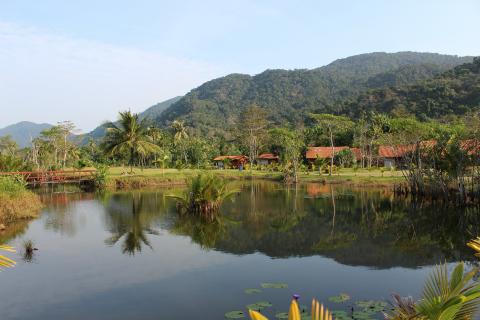
Maryknoll Lay Missioner Flávio José Rocha in Brazil writes about the right to water.
Water as a Right
Why is it important that we talk about the right to water? We need to talk about it because, unfortunately, this right has been increasingly threatened or ignored amid various socioeconomic and political challenges in our world.
This topic is not addressed as it should be by the international community. It was not present in the landmark Declaration of Human Rights of 1948, for example, probably because access to water was thought of as a right that would be never be threatened. It was only in the first decade of this millennium that the United Nations addressed this topic seriously, after the Bolivian government presented a Resolution for the Right to Water at the UN. Although it was defeated initially, Bolivia presented it again in 2010, and this resolution was accepted.
The right to water was first mentioned in international documents as a result of various international conferences in the last decade that addressed the need to protect the right to water for vulnerable groups such as women, children, and people with disabilities. We can imagine other vulnerable groups who also need to have this right protected, such as refugees living in camps or the urban homeless. In addition, lack of water has also been a cause of suffering for many indigenous people who are expelled from their lands by governments who prioritize the desires of agro-business and corporations.
Consequences of Water Shortage
A lack of water can have huge consequences in the lives of poor people. Studies show that, in many places around the world, it is still common for women have to walk many kilometers to reach a water source and then carry it back home on their heads because they do not have access to water in rural areas. Children without access to clean water often get sick and sometimes die after drinking contaminated water.
Another related problem is that politicians have used their ability to control access to water to maintain their power in many parts of the word. This happened in the Northeast of Brazil, a semiarid region inhabited by more than 20 million people. In this region the Catholic Church has done tremendous work, together with other organizations, to make water accessible to the local people, breaking a centuries-old chain of oppression.
Water is a common good that belongs to all living beings, but it is being threatened by a growing water market that sees water as a profitable “product.” Private water companies, often monopolies, are present in various parts of the globe. Their presence and prevalence raise the question of how governments will maintain power over this natural resource that is essential for each country’s sovereignty.
Regarding this critical issue of our time, Pope Francis commented in his encyclical Laudato Si’ that “Even as the quality of available water is constantly diminishing, in some places there is a growing tendency, despite its scarcity, to privatize this resource, turning it into a commodity subject to the laws of the market. Yet access to safe drinkable water is a basic and universal human right, since it is essential to human survival and, as such, is a condition for the exercise of other human rights. Our world has a grave social debt towards the poor who lack access to drinking water, because they are denied the right to a life consistent with their inalienable dignity.”
As the Pope mentions in this pastoral letter, it is not enough for water to be accessible, but it needs to be clean and drinkable as well. The commodification of water usually makes it even more inaccessible, especially for the poor. Several countries have experimented with privatizing water, and their examples indicate that once water is privatized, it becomes unaffordable for the poor.
What Can Be Done?
The World Health Organization says that the minimum quantity of water necessary for a human being is 100 liters (approximately 26 gallons) per day. Many groups are already discussing the idea of having governments providing this quantity of water per capita for free. Putting this into practice could be very expensive at first, but considering how much governments will save on hospital expenses caused by water shortages, it could be a good solution. Also considering that some governments spend billions of dollars subsidizing the oil industry and agrobusiness, governmental provision of basic quantities of water does not sound like a bad idea at all.
All people of good will must affirm that when the right to water is denied, many other rights are denied along with it, such as health. This is especially true for those who are already vulnerable and marginalized in our societies.
